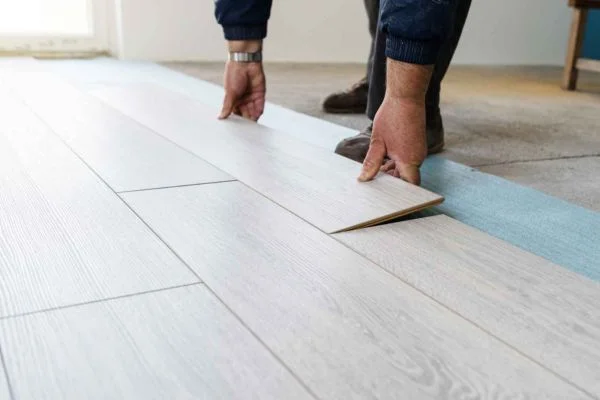In recent years, luxury vinyl plank (LVP) flooring has become increasingly popular. Its water resistance, durability, and affordability make it a favorite among those who want hardwood flooring without the price tag. The question that many people have is, “how long does LVP flooring last?” This comprehensive guide covers everything you need to know about LVP’s lifespan.
The lifespan of LVP flooring usually ranges from 10 to 20 years, depending on the quality, installation, and maintenance.
How Long Does Lvp Flooring Last | Let’s Find Out
1) The Lifespan of LVP Flooring:
Many things affect the lifespan of LVP flooring, like its quality, how it’s installed, how much foot traffic it gets, and how much moisture it gets.
High-quality LVP flooring can last up to 20 years, while lower-quality options might only last 5-10. The lifespan of LVP flooring can also be extended with proper installation, cleaning, and maintenance.
2) Quality of LVP Flooring:
LVP flooring’s quality plays a significant role in its lifespan. It’s thicker, has better wear layers, and is more durable than lower-quality LVP flooring.
The thicker the wear layer, the more resistant the floor is to scratches, scuffs, and everyday wear and tear. LVP flooring is, therefore, essential for longevity.
3) Installation Method and Foot Traffic:
The longevity of LVP flooring depends on proper installation, whether glue-down or snap-lock. Poor installation can cause premature wear and damage.
Additionally, high foot traffic areas like entryways, kitchens, and hallways can show signs of wear and tear much faster and affect the LVP flooring’s lifespan.
4) Exposure to Moisture:
Because LVP flooring is naturally moisture-resistant, it’s great for kitchens, bathrooms, and other high-humidity areas. While LVP flooring may be water-resistant, moisture can get through the seams and edges, causing mold, mildew, and further water damage. As a result, spills and moisture should be cleaned up as soon as possible to avoid any problems.
5) Maintenance and Care:
LVP flooring can last a long time with proper maintenance. Cleaning regularly, using non-abrasive cleaners, and avoiding heavy furniture when moving are all good practices. Using furniture protectors, rugs, and mats can also reduce scratches and wear.
Also Read: Can You Use A Steam Mop On LVP Flooring?
How Often Do You Need To Replace Lvp Flooring?

If you want to know how often you need to replace your LVP flooring, you need to consider the quality of the installation. If the installation is done right, you should be able to enjoy your flooring for many years.
If the installation was bad, you might notice issues with your flooring sooner rather than later. You can tell a bad installation by gaps between the planks, buckling or warping, and uneven edges.
The amount of traffic your LVP flooring gets daily can also affect its lifespan. You should replace your flooring more often if you have a big family or host many parties at home.
If you have pets, their claws can scratch the surface of your flooring, which is more noticeable in darker colors or smooth finishes.
Thirdly, direct sunlight can also shorten the lifespan of your LVP flooring. UV rays fade the color of your flooring over time, making it look old and faded. The good news is that modern flooring products now come with UV-resistant coatings, which help reduce fading.
Using curtains or blinds in your windows and applying a protective film to the glass will help minimize UV exposure if you already have a flooring product that isn’t UV-protected.
Last but not least, moisture and humidity can affect the lifespan of your LVP flooring. LVP flooring expands and contracts with moisture, just like natural wood.
Extreme humidity can loosen the adhesive, and repeated water exposure can warp or buckle the planks. Any spills or leaks in your home should be addressed right away.
Also Read: How To Clean Dog Kennel Flooring?
Does Vinyl Plank Flooring Wear Out?
The first thing you must know about vinyl plank flooring is its composition. It has three layers: a wear layer, a print layer, and a core layer. It’s the topmost layer that gets the most wear and tear.
Durability depends on the thickness of the wear layer. Vinyl plank flooring usually has a wear layer between 6-12 mils. A high-quality vinyl floor has a wear layer up to 30 mils thick, making it more durable.
Also, how much foot traffic and maintenance you do will affect the lifespan of your vinyl flooring. Vinyl plank flooring can last up to 20 years, depending on the quality.
How you care for your flooring will determine how long it lasts. You can extend its lifespan by cleaning it regularly and caring for it. You can preserve your vinyl floors using a soft-bristled brush instead of a vacuum cleaner.
In addition, vinyl plank flooring can wear out faster when exposed to sunlight. It’s easy for the flooring to fade and discolor in direct sunlight, especially if exposed for a long time.
Use curtains, blinds, or other shading options to block sunlight. Additionally, it’s best to avoid dragging heavy objects on the flooring as this can cause scratches and scuff marks.
Fourth, vinyl plank flooring is water-resistant to withstand spills and moisture. However, excessive moisture can warp and damage the floor.
Pools of water or humid environments can cause swelling, making them hard to remove. To prevent water from entering your house, wipe up spills as soon as they happen, and use doormats.
Lastly, proper maintenance and exposure to wear and tear can last for years. High-quality vinyl plank flooring can handle traffic, pet claws, and minor accidents despite scratches and fading over time. As a result, it’s a durable and cost-effective flooring option.
Also Read: How To Add Water To In Floor Heating System?
Bottom Line:
Now you know How Long Does Lvp Flooring Last. As a long-lasting, low-maintenance, and relatively affordable alternative to hardwood flooring, LVP flooring is a significant investment. Depending on factors like quality, installation, traffic, and moisture exposure, LVP flooring can last long.
You can enjoy your LVP flooring for decades by investing in high-quality flooring, installing and maintaining it properly, and paying attention to all the other factors.



